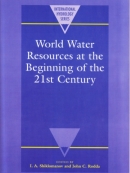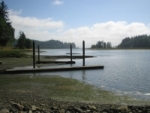HEEJUN CHANG
Professor and Chair, Department of Geography |
||
Department of Geography Tel: (503) 725-3162 |
||
AWARDS
Excellence for Referee Award, 2009. Journal of Hydrology
Outstanding Researcher Award. 2007. Columbia-Willamette
Chapter of Sigma Xi
Best Poster Award. 2006. International Water Association
My teaching and research interests lie in hydrology and spatial analysis. In hydrology and water resources, I am interested in examining the human modification of the hydrologic system. I examine the complex interactions among climate change, land use change, and water management that drive major changes in water quantity and quality. To understand and model such a complex system, I use an integrated approach that embraces biophysical sciences, social sciences, and information sciences. Hence the use of geographic information technology including geocomputational methods and visual spatial analysis is essential to conduct my research and teaching.
"When there is no road, Create one and move forward. Hope starts there." (Koo Sang, Philosopher)
SELECTED PUBLICATIONS
Chang, H., and Psaris, M.* (2013) Local landscape predictors of maximum stream temperature and thermal sensitivity in the Columbia River basin, USA. Science of the Total Environment 461-462: 587-600
Chang, H., Jung, I., Strecker, A., Wise, D., Lafrenz, M., Shandas, V., Moradkhani, H., Yeakley A., Pan, Y., Bean, R., Johnson, G., Psaris M. (2013) Water Supply, Demand, and Quality Indicators of the Spatial Distribution of Water Resources Vulnerability in the Columbia River Basin, USA. Atmosphere-Ocean (in press)
Chang, H., Jung, I-W., Steele, M.*, Garnett, M. (2012) Spatial Patterns of March and September streamflow trends in Pacific Northwest Streams. Geographical Analysis 44(3): 177-201.
Betsy, B.*, Chang, H., and Parandvash, H. (2012) Land-use, temperature and single family residential water use patterns in Portland, Oregon and Phoenix, Arizona, Applied Geography 35: 142-151
Pratt, B.* and Chang, H. (2012) Effects of Land Cover, Topography, and Built Structure on Seasonal Water Quality at Multiple Spatial Scales, Journal of Hazardous Materials 209/210: 48-58.
Chang, H. and Lawler, K.* (2011) Impacts of climate variability and change on water temperature in an urbanizing Oregon basin. In Water Quality: Current Trends and Expected Climate Change Impacts, IAHS Publication 348: 123-128
Jung, I.-W., Chang, H. and Moradkhani, H. (2011) Quantifying uncertainty in urban flooding analysis considering hydroclimatic projection and urban development effects, Hydrology and Earth System Sciences 15(2): 617-633.
House-Peters, L.* and Chang, H. (2011) Urban water demand modeling: Review of concepts, methods, and organizing principles, Water Resources Research 47 W05401.
Praskievicz, S.* and Chang, H. (2011) Impacts of climate change and urban development on water resourdes in the Tualatin River basin, Oregon. Annals of the Association of American Geographers 101(2) 249-271.
Chang, H. and Jung, I.-W. (2010) Spatial and temporal changes in runoff caused by climate change in a complex large river basin in Oregon. Journal of Hydrology 388(3-4): 186-207.
Chang, H., Lafrenz, M., Jung, I-W., Figliozzi, M., Platman, D., and Pederson, C. (2010) Potential impacts of climate change on flood-induced travel disruption: A case study in Portland, Oregon, USA. Annals of the Association of American Geographers 100(4): 938-952.
Praskievicz, S.*, and Chang, H. (2009) A review of hydrologic modeling of basin-scale climate change and urban development impacts,Progress in Physical Geography 33(5): 650-671.
Chang, H., Franczyk, J.*, and Kim, C. (2009). What is responsible for increasing flood risks? The case of Gangwon Province, Korea. Natural Hazards 48(3): 339-354.
Franczyk, J.* and Chang, H. (2009) The effects of climate change and urbanization on the runoff of the Rock Creek in the Portland metropolitan area, OR, USA. Hydrological Processes 23(6): 805-815 (Editor's choice of top articles).
Chang, H., and Franczyk, J.* (2008). Climate change, land use change and floods: Toward an integrated assessment. Geography Compass 2(5): 1549-1579: doi: 10.1111/j.1749-8198.2008.00136.x (featured article in Hydrology and Water Resources).
Chang, H. (2008). Spatial analysis of water quality trends in the Han River basin, South Korea.Water Research 42: 3285-3304
Duh, J. Shandas, V., Chang, H., and George, L. (2008). Rates of urbanization and the resilience of air and water quality. Science of the Total Environment 400 (1-3): 238-256.
Boeder, M.* and Chang, H. (2008) Multi-scale analysis of oxygen demand trend in an urbanizing Oregon watershed.Journal of Environmental Management 87(4): 567-581.
Levell, A.* and Chang, H. (2008) Monitoring the
channel process of a stream restoration project in an urbanizing watershed:
A case study of Kelley Creek, Oregon, USA.River Research and Applications 24(2): 169-182.
Graves, D.* and Chang, H. (2007) Hydrologic impacts of climate change
in the Upper Clackamas basin of Oregon.Climate Research 33(2): 143-157.
Chang, H. (2007) Comparative streamflow characteristics in urbanizing
basins in the Portland Metropolitan Area, Oregon, USA, Hydrological Processes 21(2): 211-222.
Chang, H. (2004) Water Quality Impacts of Climate and Land Use Changes in Southeastern
Pennsylvania, The Professional Geographer, 56(2): 240-257.


